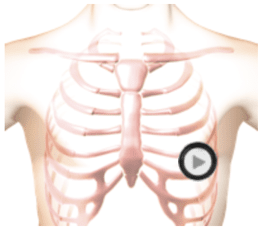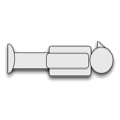Severe Mitral Regurgitation Lesson
Where to Auscultate


The patient was supine during auscultation.
Description
This lesson presents severe mitral regurgitation. The first heart sound is normal while the second heart sound is widely split. A third heart sound gallop follows S2. A loud, rectangular, pansystolic murmur is present. In addition, a brief, rumbling, diamond-shaped diastolic murmur immediately after the third heart sound.
In the cardiac anatomy video, you can see the enlarged left atrium and left ventricle. Observe the turbulent blood flow from the left ventricle into the left atrium. This is the systolic murmur. Also notice the brief turbulent blood flow from the left atrium to the left ventricle during diastole. This is caused by too much blood in the left atrium which forces blood back into the ventricle during diastole producing the flow rumble. Severe mitral regurgitation is often caused by degeneration of the mitral valve leaflets.
Phonocardiogram
Anatomy
Severe Mitral Regurgitation
Authors and Sources
Authors and Reviewers
-
Heart sounds by Dr. Jonathan Keroes, MD and David Lieberman, Developer, Virtual Cardiac Patient.
- Lung sounds by Diane Wrigley, PA
- Respiratory cases: William French
-
David Lieberman, Audio Engineering
-
Heart sounds mentorship by >W. Proctor Harvey, MD
- Special thanks for the medical mentorship of Dr. Raymond Murphy
- Reviewed by Dr. Barbara Erickson, PhD, RN, CCRN.
-
Last Update: 11/10/2021
Sources
-
Heart and Lung Sounds Reference Library
Diane S. Wrigley
Publisher: PESI -
Impact Patient Care: Key Physical Assessment Strategies and the Underlying Pathophysiology
Diane S Wrigley & Rosale Lobo - Practical Clinical Skills: Lung Sounds
- PESI Faculty - Diane S Wrigley
-
Case Profiles in Respiratory Care 3rd Ed, 2019
William A.French
Published by Delmar Cengage -
Essential Lung Sounds
by William A. French
Published by Cengage Learning, 2011 -
Understanding Lung Sounds
Steven Lehrer, MD
-
Clinical Heart Disease
W Proctor Harvey, MD
Clinical Heart Disease
Laennec Publishing; 1st edition (January 1, 2009) -
Heart and Lung Sounds Reference Guide
PracticalClinicalSkills.com